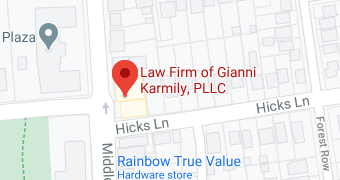The most serious crimes are the crimes that result in the loss of someone’s life. If you are charged with murder, manslaughter, or with any other homicide charge on Long Island, you must be advised and represented by a Nassau County homicide attorney.
What constitutes murder and manslaughter in New York, and how do these crimes differ? If you are facing a homicide charge, what are your rights? What steps should you take? When should you contact a Long Island homicide attorney for the legal help that you are going to need?
If you will continue reading this brief discussion of homicide and the law in the State of New York, you will learn the answers to these questions, and you will learn more about your rights if you are charged with murder, manslaughter, or with another homicide charge on Long Island.
What Are the Different Homicide Charges in New York?
The law in New York defines a homicide as “conduct which causes the death of a person.” For homicide investigators, determining exactly which homicide charge should be filed against a particular suspect may be quite difficult in some cases.
One reason why it may be difficult to determine which homicide charge should be filed is because the law in New York sets forth twelve different homicide charges, which are:
1. Murder in the first degree, a Class A-1 felony
2. Murder in the second degree, a Class A-1 felony
3. Aggravated murder, a Class A-1 felony
4. Manslaughter in the first degree, a Class B felony
5. Manslaughter in the second degree, a Class C felony
6. Aggravated manslaughter in the first degree, a Class B felony
7. Aggravated manslaughter in the second degree, a Class C felony
8. Criminally negligent homicide, a Class E felony
9. Aggravated criminally negligent homicide, a Class C felony
10. Vehicular manslaughter in the first degree, a Class C felony
11. Vehicular manslaughter in the second degree, a Class D felony
12. Aggravated vehicular homicide, a Class B felony
Every New York homicide charge is a felony charge that may be penalized upon conviction with a prison term. However, not every situation where a person is killed is a crime. It’s not a crime to kill in self-defense, and if you do that, the District Attorney’s Office has to prove in court beyond a reasonable doubt that the killing was, in fact, not an act of self-defense.
When Is the Charge First-Degree Murder?
If you are charged with first-degree murder on Long Island, you will need aggressive defense representation from a Long Island homicide attorney.
A homicide may be charged as first-degree murder when an adult 18 years old or older, while allegedly intending to cause the death of another person, allegedly caused the death of that person or a third person, and at least one of these aggravating factors was also present:
1. The victim was a law enforcement officer, correctional employee, judge, or witness.
2. The murder was for hire, committed during the commission of certain felonies, committed while the defendant was serving life in prison, accompanied by torture, or committed as (or as part of) a terrorist act.
What Is “Felony” Murder?
First-degree “felony murder” may be the charge if a victim is killed in the course of or immediate flight from specific felonies including robbery, kidnapping, arson, rape, sexual abuse, and certain degrees of burglary.
First-degree felony murder differs from second-degree felony murder because first-degree felony murder requires the defendant’s intention to kill the victim or a bystander instead of merely the intention to commit the underlying crime.
Additionally, a defendant facing a first-degree felony murder charge must have allegedly caused the victim’s death directly or ordered an accomplice to do so, whereas a second-degree felony murder charge only requires a defendant to be an alleged accomplice of the killer.
What Is Second-Degree Murder in New York?
Second-degree murder in New York is committed in one of these ways:
1. While intending to cause someone’s death, a defendant in fact did cause that person’s death or another person’s death.
2. The defendant recklessly engaged “in conduct which creates a grave risk of death to another person” and thereby caused the death of that person while demonstrating “depraved indifference to human life.”
3. Acting with others or alone, the defendant committed or attempted a specific felony, and in the course of that crime or the immediate flight therefrom, he or she caused the death of a non-participant in the crime.
4. While demonstrating a “depraved indifference to human life,” a defendant age 18 or older recklessly engaged in “conduct which created a grave risk of serious physical injury or death” to a child under 11 years old and caused the death of that child.
5. During the commission of a specific crime such as rape or sexual assault, a defendant age 18 or older intentionally caused the death of a child under 14 years old.
What Are a Homicide Defendant’s Rights?
Nothing in the law is more serious than a homicide charge. If you’re currently under investigation for a homicide or if you have already been charged for a homicide offense, you have the right to have an attorney present when you are questioned by police or participate in a police lineup.
In homicide cases, the police may use a number of strategies when they question a suspect, but you have the right to remain silent, and anything that you say may be used against you. You can simply say, “I would prefer not to answer any question and speak to an attorney.”
How Will a Criminal Defense Attorney Work on Your Behalf?
In homicide cases, a Nassau County homicide attorney will work for you in a variety of ways: by filing motions to dismiss or suppress; negotiating with the prosecutor; compiling and scrutinizing evidence; questioning the witnesses; and keeping you fully informed as your case develops.
Your Long Island criminal defense attorney will aggressively protect your legal rights, provide the legal advice that you will need, and investigate your case diligently to determine the truth about what actually happened.
If your attorney cannot have the homicide charge against you dropped by the prosecutor or dismissed by the court, and your homicide case goes to trial, your attorney will explain to the jury exactly what happened and will tell the jurors why they should find you not guilty.
What Defenses May Be Offered Against a Homicide Charge?
While your attorney will develop a defense strategy based upon the particular details of your case, generally speaking, the defenses against a homicide charge include:
1. You acted legally, in self-defense or in the defense of another person.
2. Your action was not the cause of the victim’s death.
3. Another person committed the homicide.
What If the Evidence Against You Is Overwhelming?
If the evidence against you is overwhelming and your conviction on a homicide charge is likely, rather than taking your case to trial, your defense lawyer may instead negotiate a plea bargain that would enable you to serve a reduced or alternative sentence.
Don’t even think about acting as your own lawyer or negotiating by yourself with the prosecutor. When the charge is homicide, any mistake on your part could end up having very serious consequences. Let your attorney do the talking and negotiating on your behalf, and adhere to your attorney’s advice.
This cannot be stressed strongly enough: If you face a homicide charge on Long Island, you must be represented by a criminal defense attorney who has successfully handled similar cases – an attorney who knows how to bring your case to its best possible conclusion.









